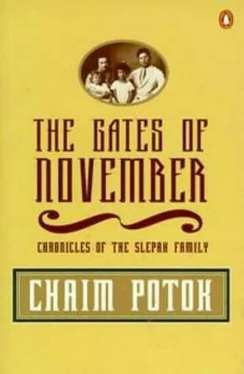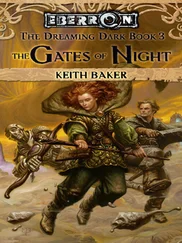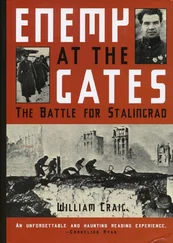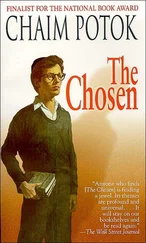She stopped, and Volodya added, “There is reason to hope that Masha’s brother and sister-in-law will be able to leave if we can keep their son out of the army.” The young man said something in Russian and returned to his room. His parents went into the kitchen. Masha and Adena sat for a while on the couch, talking quietly together.
Sometime later we said good-bye to Masha’s brother and sister-in-law and nephew and started back. The snow was still falling. Volodya and Masha said they would accompany us to the hotel.
The Metro was nearly deserted. Volodya and I sat on one side of the car, and opposite us were Masha and Adena. Adena told me later that Masha talked mostly about the years she and Volodya had spent in Siberia. Her legs, badly frostbitten, were not as painful now as they had once been, though she couldn’t stand for very long. Glancing at Masha from time to time, I caught an occasional flash of fire from the eyes behind the thick glasses. It occurred to me that there was probably a good deal more to her than she had revealed tonight, and it saddened me that I would never have the opportunity to know her better.
We emerged from the Metro station into the snow. It was quite late. I put my scarf over my face, a feeble defense against the wind. Near the steps outside the hotel we stood a few minutes longer, still talking.
“I have read two of your books in English,” Volodya said. “And now, here we are together, speaking as friends.”
We stood there some while longer, reluctant to part. Finally, we shook hands and embraced and said to one another, “Lehitraot,” which is Hebrew for “until we meet again,” though none of us really believed that was remotely probable. Adena and I watched them walk slowly away and vanish into the snow-shrouded Russian night.
In the months that followed, I would remember the Slepaks at odd moments: staring out a window at a snowstorm; reciting the blessing over a cup of wine before a Shabbat dinner; on a subway train; reading news from the Soviet Union. I followed with admiration and heartache their strife-filled lives. Then, in October 1987, with a suddenness that was stupefying, they received their exit visas and were out of the Soviet Union and on their way to Israel!
One winter evening not long afterward, in a restaurant in New York, my agent, Owen Laster, asked me and Adena if we knew the Slepaks. We said yes, we knew them. He told me that Volodya had made tapes in Russian of their story and the tapes had been translated into English by one of the sons. Would I be interested in listening to the tapes and writing about the Slepaks?
The Jewish dissident struggle was then at its height. I thought: Listen to the tapes, see if they’re worthwhile, and maybe join the effort to free the Russian Jews.
I agreed to listen to the tapes. In due course, book contracts were signed. I began the necessary research. Adena and I flew to Israel, met with the Slepaks, and returned with nearly forty hours of video and audiotapes, which were later augmented by more than twenty additional hours of audiotapes, many dozens of handwritten faxes, and countless telephone calls concerning details large and small.
All the material in my possession-tapes, faxes, records of face-to-face conversations, and telephone calls-constituted the chronicles of a family that was in many ways an extreme example of the perennial Jewish plight in Russia, the plight of a deviant people against whom the Russians had unceasingly defined themselves. But as I went through those chronicles again and again, a very particular family drama began to surface, and I came slowly to realize that what I had in my possession was not only the classic tale of Russians and Jews at each other’s throats but also a tangled and singular human story about a father and a son-with a baffling mystery at its core.
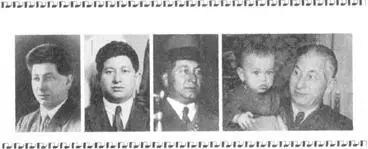
*
Shortly after the turn of the century, a thirteen-year-old boy in a small town in White Russia fled from the impoverished home of his mother, his father having died five years earlier. In the years that followed, he went on moving, across oceans and continents. By the time he reached the mainland of Asia nearly two decades later, he had been remarkably metamorphosed from a harmless small-town Russian Jewish boy into a cultured and dedicated Bolshevik killer.
The small town was Kopys, about fifteen kilometers from the town of his birth, Dubrovno, on the Dnieper River.
In 1766 there were 801 Jewish taxpayers in Dubrovno and its environs. One hundred years later it had become the center of a textile industry that manufactured and distributed prayer shawls throughout Russia and Europe and as far away as America. By the end of the eighteenth century Dubrovno also had a tile factory and a community of religious scribes, who wrote phylacteries, Torah scrolls, and mezuzahs, the little containers with passages of the Torah that Jews affix to the doorposts of their homes.
The weavers of Dubrovno labored on antiquated handlooms and were brutally exploited by the merchants, who sold them yarn at high profit and purchased finished products at low prices. During the latter half of the nineteenth century, big-city competition from machine-woven prayer shawls crippled the textile industry of Dubrovno. The weavers began to leave. In 1897, four years after Solomon Slepak was born, there were 4,364 Jews in Dubrovno, constituting about 57 percent of the total population. The town was so inconsequential that it did not even have its own railway station.
Photographs offer us images of Jewish life in Dubrovno.
A portrait of Solomon Slepaks father shows a man with a long black beard and a tall dark skullcap. He had migrated to Dubrovno from somewhere in the Ukraine. Family lore relates that he was physically very strong; that his life’s dream was to send his son, Solomon, to a yeshiva, an academy of higher Jewish learning, where he would study for the rabbinate; and that in a certain Ukrainian town about one-third of the Jews were named Slepak, which in Ukrainian means “blind.”
There is a full-length photograph of an elderly man named Munya, who was a sexton in a Dubrovno synagogue. He also wears a tall dark skullcap and a long dark coat that hangs slightly open, revealing knee-high boots and ritual fringes. He stares at us through shadowed, melancholy eyes. His lips are thin, unsmiling. A flowing white beard reaches nearly to his chest. There is a stoic grace about his poverty, a quiet dignity to his burdened life. Though there is no evidence that he was related to the Slepaks, it takes no prodigious leap of the imagination to envision him as similar in look and garb to Solomon Slepak’s father, who was a melamed, a poor teacher of children.
And there is a photograph of a synagogue celebration in Dubrovno. An extraordinary occasion, one of enormous joy: A scribe has completed the writing of a Torah scroll, a lengthy and demanding sacred enterprise, a year or more of the most painstaking labor. In the photograph we see the Holy Ark, which is richly ornamented with a bevy of animals and birds and a delicately filigreed facade. A crowd of about sixty men, women, and children stand in a loose semicircle behind a bearded man in a cap, knee breeches, and boots, who appears to be doing some sort of dance. Two young-looking men, a fiddler and a clarinetist, play their instruments. The clarinetist has no beard and is wearing a derby; perhaps he is a professional musician, an outsider, hired for the occasion. A bearded elder carries the Torah scroll, which is suitably adorned with a silver crown. In the background, near the Ark and the wall of the synagogue, stand women and children in neatly arranged rows. In the foreground are men and boys. And once again it is no great feat of the imagination to envision one of those boys as young Solomon Slepak, who was a student in his father’s little school and certainly attended synagogue.
Читать дальше
